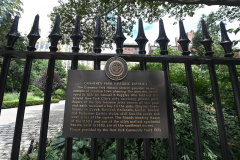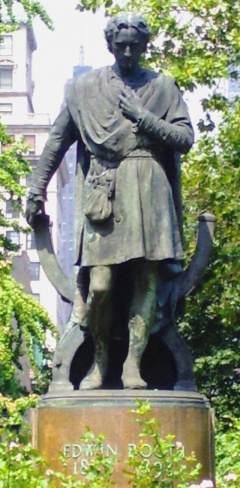Difference between revisions of "Gramercy Park"
(→Real World Background) |
|||
| Line 4: | Line 4: | ||
==Real World Background== | ==Real World Background== | ||
| + | [[Image:Gramercy Park.jpg|thumb|left|240px|Gramercy Park]] | ||
[[Image:Edwin_Booth_Statue.jpg|thumb|240px|The Statue of Edwin Booth located in Gramercy Park]] | [[Image:Edwin_Booth_Statue.jpg|thumb|240px|The Statue of Edwin Booth located in Gramercy Park]] | ||
[[Image:Mayor_of_Gramercy_Park.jpg|thumb|240px|The self-proclaimed "Mayor of Gramercy Park". Demona hasn’t killed this woman. Her actions allow the park to be an ideal hiding place. She draws the ire of the residents and the city… Dominique flies completely under the radar. And smiles when Arlene has the kids booted out. And she completely validates her label of the bile that is humanity. Why kill the human who she can point to and say “see?” without being hunted? Arlene dies when all of humanity does. Not before. Gotta keep that half-truth ringing.]] | [[Image:Mayor_of_Gramercy_Park.jpg|thumb|240px|The self-proclaimed "Mayor of Gramercy Park". Demona hasn’t killed this woman. Her actions allow the park to be an ideal hiding place. She draws the ire of the residents and the city… Dominique flies completely under the radar. And smiles when Arlene has the kids booted out. And she completely validates her label of the bile that is humanity. Why kill the human who she can point to and say “see?” without being hunted? Arlene dies when all of humanity does. Not before. Gotta keep that half-truth ringing.]] | ||
Revision as of 09:08, 19 June 2024
Gramercy Park is a small, fenced-in private park in the neighborhood of Gramercy. Demona resides near the park in a townhouse. It is the only private park in all of New York City.
And if you read the real world background section, isn't it just the perfect neighborhood for her?
Real World Background

In 1831, Samuel B. Ruggles, a developer and advocate of open space, proposed the idea for the park due to the northward growth of Manhattan. He bought the property, twenty-two acres of what was then a farm called "Gramercy Farm", from the heirs of James Duane, son of the former mayor, father of James Chatham Duane, and a descendant of Peter Stuyvesant. Ruggles then deeded the land on December 17th, 1832 to five trustees, who pledge to hold forty-two lots in trust to be used as parkland.
In 1863, in an unprecedented gesture, Gramercy Park was opened to Union soldiers involved in putting down the violent Draft riots which broke out in New York, after conscription was introduced for the Civil War.
In the center of the park is a statue of one of the area's most famous residents, Edwin Booth, which was dedicated on November 13th, 1918. Booth was one of the great Shakespearean actors of 19th Century America, as well as the brother of John Wilkes Booth, the assassin of Abraham Lincoln. The mansion at No. 16 Gramercy Park (South) was purchased by Booth and renovated by Stanford White at his request to be the home of the Players' Club, which Booth founded. He turned over the deed to the building on New Year's Eve 1888. Next door at No. 15 Gramercy Park (South) is the National Arts Club, established in 1884 in a Victorian Gothic mansion which was originally home to the New York Governor and 1876 Presidential Candidate, Samuel J. Tilden. Tilden had steel doors and an escape tunnel to East 19th Street to protect himself from the sometimes violent politics of the day.
On September 20th, 1966, a part of the Gramercy Park neighborhood was designated an historic district, the boundaries of which were extended on July 12, 1988. The district was listed on the National Register of Historic Places in 1980.
Since December 31st, 1831, Gramercy Park has been held in common by the owners of the thirty-nine surrounding structures. Two keys are allocated to each of the original lots surrounding the park, and the owners may buy keys for a fee, which was originally $10 per key, but as of 2008 was $350, with a $1,000 fee for lost keys, which rises to $2,000 for a second instance. The Medeco locks are changed annually, and any property that does not pay the annual assessment of $7,500 per lot has its key privileges revoked; additionally, the keys are very hard to duplicate. As of 2012, there were three-hundred-eighty-three keys in circulation, each individually numbered and coded.
At one time, the park was open to the public on an annual Gramercy Day whose date changed each year but was often the first Saturday in May. In 2007, the trustees announced that the park would no longer be open for Gramercy Day because it "had turned into a street fair". The park, however, continues to be open to the public on Christmas Eve. Visitors to the park may not drink alcohol, smoke, ride a bicycle, walk a dog, play ball or Frisbee, or feed the birds and squirrels.
Notable residents have included James Cagney, Chelsea Clinton, Thomas Edison, Margaret Hamilton, Gregory Peck, Julia Roberts, Edward Sheldon, John Steinbeck, Uma Thurman, Oscar Wilde.
Gramercy Park is said to be ruled by Arlene Harrison "with an iron fist" since 1997. She patrols the park almost everyday with a clipboard. Rules she enforces prohibit smoking, drinking alcohol, bike riding, taking photos, walking a dog, playing sports, throwing a Frisbee, feeding wildlife, and a ban on any type of musical entertainment. As the public is banned from the park; anyone who slips in illegally often doesn’t know a key is also needed to exit the park, and get locked in. In 2000, one of the trustees phoned the police to report a field trip of minority kids from a nearby public school to the park. The trustee said ‘this is a private trust not for these kind of kids.” A a suit in federal court against the Gramercy Park Trust alleging they discriminated against the children. A $15,000 settlement was asked for each of the children and for the right for them to visit the park every Martin Luther King Day. Instead, the park trustees ponied up $40,000 for each student in exchange for not having the right to come visit once a year. [1]
See Also
- Gramercy Park at Wikipedia, the Free Encyclopedia

